- Learning time
- 60 minutes
- First play time
- 120 minutes
Gentes
Designed by: Stefan Risthaus
In Gentes you are building your civilisation; an ancient people looking to expand and grow over three eras (with two rounds in each era) and expand ‘the best’ by scoring the most points!
Initial impressions may bewilder: the board looks like a mash-up of ancient hieroglyphs and a slightly incoherent spreadsheet. As ever, though, the logic of it all falls into place with a bit of familiarity: each player has their own board in front of them that keeps track of the characters their civilisation currently has: soldiers, priests, traders, artisans, nobles and scholars – with the caveat that three pairs of characters each occupy the same six-sectioned row, and so they have to share: if you have six soldiers, for instance, you have no room for traders. Why do you need to add of these characters? Because they allow you to play cards, which – more so than the board – are the heart of the game.
The board is seeded with lots of cardboard chits representing actions. On your turn, you choose an available chit to action: it might be to get more cards into your hand; to play a card from your hand (more on that in a minute); get more characters on your board, or place cities on the board. Taking a chit usually costs money, or time; in fact it’s usually both. So you can only take the action if you have the money to pay the cost, and the time to spend: time available and spent is measured on your player board: both the chit you took and any additional time (manifest in hourglass tokens) are placed there.
Playing a card gets you the good stuff: often points but additional characters, or other little bonuses that can either be triggered during play.
Each player starts with six cities, and they can be placed on the map to trigger bonuses: at the moment of building, and at the end of each round, which is a good way to ensure a supply of money, points or indicator cubes.
Indicator cubes are used in a number of ways: they keep track of what special abilities or modifiers you use in each round, but perhaps most crucially, cubes gathered on your player board can be used in two different ways: to ‘pay’ for characters when you play a card, or to manipulate the characters you have: reducing two to increase two others.
It’s worth mentioning that you can double up time on your player board: cramming two hourglasses into a single space. The downside of this is that one of those hourglasses will carry over into the next round, taking up valuable time! And in the last round especially this is to be avoided if possible, as time left on your board in the final scoring will cost you points. After the sixth round finishes, the game ends.
The guru's verdict
-
Take That!
Take That!
There's no direct combat at all, but city spaces on the map are limited and so are the available actions on the board itself. Taxing (getting cash) is always available however, and doesn't cost you too much time.
-
Fidget Factor!
Fidget Factor!
This isn't a game for young kids, and indeed on a first play adults may need a fidget spinner or some equivalent. But it'll speed up - once you know what you're doing your options are often limited by a shortage of cash (or time) anyway!
-
Brain Burn!
Brain Burn!
This game is a puzzle - the challenge here is to connect the dots and 'synergise' your cards by having to work as little as possible in order to play them. The best puzzler wins.
-
Again Again!
Again Again!
Although there's very little in the way of randomness here (the exception being the order the cards come out into the display from which you'll purchase them) Gentes does offer some depth: how are you going to combine those cards? You can play the entire game ignoring cities (and forgoing bonuses!) but as some cards cannot be built without them, it's risky. Conversely focusing too much on cities can mean you neglect the actual goal of the game, which is scoring points!

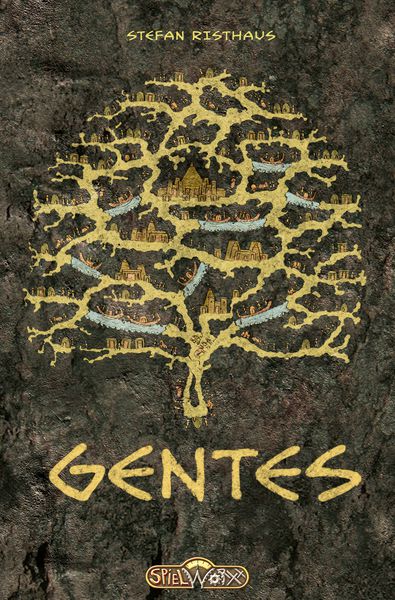

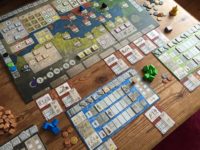
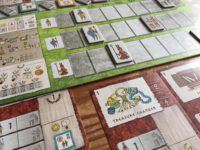
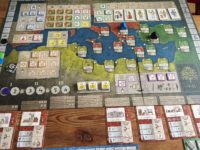


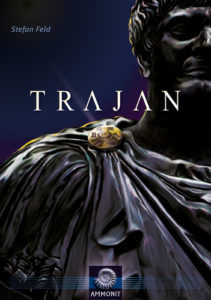

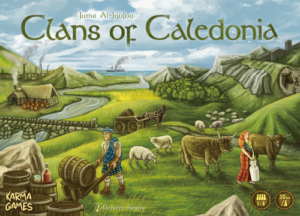
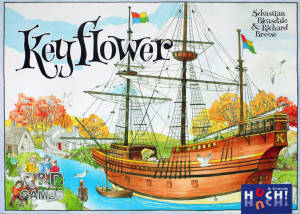

Sam says
In first play in particular there's a fair bit of rules-referencing. To be fair though, there's nothing incongruous about the rules - everything feels appropriately thematic, even if the game as a whole does feel more a puzzle than a story. It's an intriguing puzzle though, and one with a lot of options. So far I've played it three times and strategically Gentes seems to reward diversification, rather than a focus on one particular thing: racing to build all my cities early on didn't work out for me. I don't know if it does the civ-expansion thing better than many other games - Historia, for instance, has a turn-by-turn tension that's lacking here. But 'engine-building' games are something I'll rarely turn down, and Gentes doesn't buck that trend - I like the pressure the time track gives you and managing both time and money does give an unusual challenge in a game. Too much like real life? Maybe. But in real life you don't get to build an Acropolis. Fun: and for the right group, a lot of Fun.